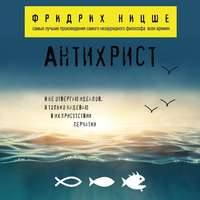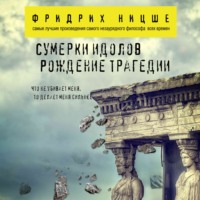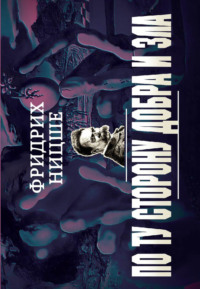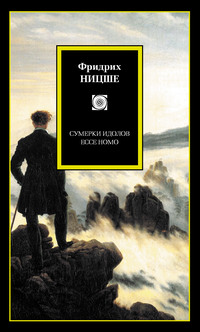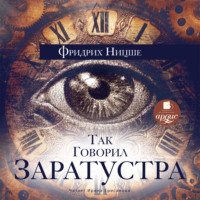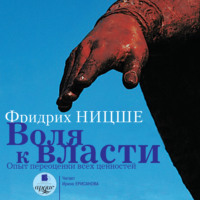 полная версия
полная версияThe Dawn of Day
40
Meditations upon Observances. – Numerous moral precepts, carelessly drawn from a single event, quickly became incomprehensible; it was as difficult a matter to deduce their intentions with any degree of certainty as it was to recognise the punishment which was to follow the breaking of the rule. Doubts were even held regarding the order of the ceremonies; but, while people guessed at random about such matters, the object of their investigations increased in importance, it was precisely the greatest absurdity of an observance that developed into a holy of holies. Let us not think too little of the energy wasted by man in this regard throughout thousands of years, and least of all of the effects of such meditations upon observances! Here we find ourselves on the wide training-ground of the intellect – not only do religions develop and continue to increase within its boundaries: but here also is the venerable, though dreadful, primeval world of science; here grow up the poet, the thinker, the physician, the lawgiver. The dread of the unintelligible, which, in an ambiguous fashion, demanded ceremonies from us, gradually assumed the charm of the intricate, and where man could not unravel he learnt to create.
41
To Determine the Value of the Vita Contemplativa. – Let us not forget, as men leading a contemplative life, what kind of evil and misfortunes have overtaken the men of the vita activa as the result of contemplation – in short, what sort of contra-account the vita activa has to offer us, if we exhibit too much boastfulness before it with respect to our good deeds. It would show us, in the first place, those so-called religious natures, who predominate among the lovers of contemplation and consequently represent their commonest type. They have at all times acted in such a manner as to render life difficult to practical men, and tried to make them disgusted with it, if possible: to darken the sky, to obliterate the sun, to cast suspicion upon joy, to depreciate hope, to paralyse the active hand – all this they knew how to do, just as, for miserable times and feelings, they had their consolations, alms, blessings, and benedictions. In the second place, it can show us the artists, a species of men leading the vita contemplativa, rarer than the religious element, but still often to be met with. As beings, these people are usually intolerable, capricious, jealous, violent, quarrelsome: this, however, must be deduced from the joyous and exalting effects of their works.
Thirdly, we have the philosophers, men who unite religious and artistic qualities, combined, however, with a third element, namely, dialectics and the love of controversy. They are the authors of evil in the same sense as the religious men and artists, in addition to which they have wearied many of their fellow-men with their passion for dialectics, though their number has always been very small. Fourthly, the thinkers and scientific workers. They but rarely strove after effects, and contented themselves with silently sticking to their own groove. Thus they brought about little envy and discomfort, and often, as objects of mockery and derision, they served, without wishing to do so, to make life easier for the men of the vita activa. Lastly, science ended by becoming of much advantage to all; and if, on account of this utility, many of the men who were destined for the vita activa are now slowly making their way along the road to science in the sweat of their brow, and not without brain-racking and maledictions, this is not the fault of the crowd of thinkers and scientific workers: it is “self-wrought pain.”3
42
Origin of the Vita Contemplativa. – During barbarous ages, when pessimistic judgments held sway over men and the world, the individual, in the consciousness of his full power, always endeavoured to act in conformity with such judgments, that is to say, he put his ideas into action by means of hunting, robbery, surprise attacks, brutality, and murder: including the weaker forms of such acts, as far as they are tolerated within the community. When his strength declines, however, and he feels tired, ill, melancholy, or satiated – consequently becoming temporarily void of wishes or desires – he is a relatively better man, that is to say, less dangerous; and his pessimistic ideas will now discharge themselves only in words and reflections – upon his companions, for example, or his wife, his life, his gods, – his judgments will be evil ones. In this frame of mind he develops into a thinker and prophet, or he adds to his superstitions and invents new observances, or mocks his enemies. Whatever he may devise, however, all the productions of his brain will necessarily reflect his frame of mind, such as the increase of fear and weariness, and the lower value he attributes to action and enjoyment. The substance of these productions must correspond to the substance of these poetic, thoughtful, and priestly moods; the evil judgment must be supreme.
In later years, all those who acted continuously as this man did in those special circumstances —i. e. those who gave out pessimistic judgments, and lived a melancholy life, poor in action – were called poets, thinkers, priests, or “medicine-men.” The general body of men would have liked to disregard such people, because they were not active enough, and to turn them out of the community; but there was a certain risk in doing so: these inactive men had found out and were following the tracks of superstition and divine power, and no one doubted that they had unknown means of power at their disposal. This was the value which was set upon the ancient race of contemplative natures– despised as they were in just the same degree as they were not dreaded! In such a masked form, in such an ambiguous aspect, with an evil heart and often with a troubled head, did Contemplation make its first appearance on earth: both weak and terrible at the same time, despised in secret, and covered in public with every mark of superstitious veneration. Here, as always, we must say: pudenda origo!
43
How many Forces must now be united in a Thinker. – To rise superior to considerations of the senses, to raise one's self to abstract contemplations: this is what was formerly regarded as elevation; but now it is not practicable for us to share the same feelings. Luxuriating in the most shadowy images of words and things; playing with those invisible, inaudible, imperceptible beings, was considered as existence in another and higher world, a world that sprang from the deep contempt felt for the world which was perceptible to the senses, this seductive and wicked world of ours. “These abstracta no longer mislead us, but they may lead us” – with such words men soared aloft. It was not the substance of these intellectual sports, but the sports themselves, which was looked upon as “the higher thing” in the primeval ages of science. Hence we have Plato's admiration for dialectics, and his enthusiastic belief in the necessary relationship of dialectics to the good man who has risen superior to the considerations of his senses. It was not only knowledge that was discovered little by little, but also the different means of acquiring it, the conditions and operations which precede knowledge in man. And it always seemed as if the newly-discovered operation or the newly-experienced condition were not a means of acquiring knowledge, but was even the substance, goal, and sum-total of everything that was worth knowing. What does the thinker require? – imagination, inspiration, abstraction, spirituality, invention, presentiment, induction, dialectics, deduction, criticism, ability to collect materials, an impersonal mode of thinking, contemplation, comprehensiveness, and lastly, but not least, justice, and love for everything that exists – but each one of these means was at one time considered, in the history of the vita contemplativa, as a goal and final purpose, and they all secured for their inventors that perfect happiness which fills the human soul when its final purpose dawns upon it.
44
Origin and Meaning. – Why does this thought come into my mind again and again, always in more and more vivid colours? – that, in former times, investigators, in the course of their search for the origin of things, always thought that they found something which would be of the highest importance for all kinds of action and judgment: yea, that they even invariably postulated that the salvation of mankind depended upon insight into the origin of things– whereas now, on the other hand, the more we examine into origins, the less do they concern our interests: on the contrary, all the valuations and interestedness which we have placed upon things begin to lose their meaning, the more we retrogress where knowledge is concerned and approach the things themselves. The origin becomes of less significance in proportion as we acquire insight into it; whilst things nearest to ourselves, around and within us, gradually begin to manifest their wealth of colours, beauties, enigmas, and diversity of meaning, of which earlier humanity never dreamed. In former ages thinkers used to move furiously about, like wild animals in cages, steadily glaring at the bars which hemmed them in, and at times springing up against them in a vain endeavour to break through them: and happy indeed was he who could look through a gap to the outer world and could fancy that he saw something of what lay beyond and afar off.
45
A Tragic Termination to Knowledge. – Of all the means of exaltation, human sacrifices have at times done most to elevate man. And perhaps the one powerful thought – the idea of self-sacrificing humanity– might be made to prevail over every other aspiration, and thus to prove the victor over even the most victorious. But to whom should the sacrifice be made? We may already swear that, if ever the constellation of such an idea appeared on the horizon, the knowledge of truth would remain the single but enormous object with which a sacrifice of such a nature would be commensurate – because no sacrifice is too great for it. In the meantime the problem has never been expounded as to how far humanity, considered as a whole, could take steps to encourage the advancement of knowledge; and even less as to what thirst for knowledge could impel humanity to the point of sacrificing itself with the light of an anticipated wisdom in its eyes. When, perhaps, with a view to the advancement of knowledge, we are able to enter into communication with the inhabitants of other stars, and when, during thousands of years, wisdom will have been carried from star to star, the enthusiasm of knowledge may rise to such a dizzy height!
46
Doubt in Doubt. – “What a good pillow doubt is for a well-balanced head!” This saying of Montaigne always made Pascal angry, for nobody ever wanted a good pillow so much as he did. Whatever was the matter with him?
47
Words block up our Path. – Wherever primitive men put down a word, they thought they had made a discovery. How different the case really was! – they had come upon a problem, and, while they thought they had solved it, they had in reality placed an obstacle in the way of its solution. Now, with every new piece of knowledge, we stumble over petrified words and mummified conceptions, and would rather break a leg than a word in doing so.
48
“Know Thyself” is the Whole of Science. – Only when man shall have acquired a knowledge of all things will he be able to know himself. For things are but the boundaries of man.
49
The New Fundamental Feeling: our Final Corruptibility. – In former times people sought to show the feeling of man's greatness by pointing to his divine descent. This, however, has now become a forbidden path, for the ape stands at its entrance, and likewise other fearsome animals, showing their teeth in a knowing fashion, as if to say, No further this way! Hence people now try the opposite direction: the road along which humanity is proceeding shall stand as an indication of their greatness and their relationship to God. But alas! this, too, is useless! At the far end of this path stands the funeral urn of the last man and grave-digger (with the inscription, Nihil humani a me alienum puto). To whatever height mankind may have developed – and perhaps in the end it will not be so high as when they began! – there is as little prospect of their attaining to a higher order as there is for the ant and the earwig to enter into kinship with God and eternity at the end of their career on earth. What is to come will drag behind it that which has passed: why should any little star, or even any little species on that star, form an exception to that eternal drama? Away with such sentimentalities!
50
Belief in Inebriation. – Those men who have moments of sublime ecstasy, and who, on ordinary occasions, on account of the contrast and the excessive wearing away of their nervous forces, usually feel miserable and desolate, come to consider such moments as the true manifestation of their real selves, of their “ego,” and their misery and dejection, on the other hand, as the effect of the “non-ego”. This is why they think of their environment, the age in which they live, and the whole world in which they have their being, with feelings of vindictiveness. This intoxication appears to them as their true life, their actual ego; and everywhere else they see only those who strive to oppose and prevent this intoxication, whether of an intellectual, moral, religious, or artistic nature.
Humanity owes no small part of its evils to these fantastic enthusiasts; for they are the insatiable sowers of the weed of discontent with one's self and one's neighbour, of contempt for the world and the age, and, above all, of world-lassitude. An entire hell of criminals could not, perhaps, bring about such unfortunate and far-reaching consequences, such heavy and disquieting effects that corrupt earth and sky, as are brought about by that “noble” little community of unbridled, fantastic, half-mad people – of geniuses, too – who cannot control themselves, or experience any inward joy, until they have lost themselves completely: while, on the other hand, the criminal often gives a proof of his admirable self-control, sacrifice, and wisdom, and thus maintains these qualities in those who fear him. Through him life's sky may at times seem overcast and threatening, but the atmosphere ever remains brisk and vigorous. – Furthermore, these enthusiasts bring their entire strength to bear on the task of imbuing mankind with belief in inebriation as in life itself: a dreadful belief! As savages are now quickly corrupted and ruined by “fire-water,” so likewise has mankind in general been slowly though thoroughly corrupted by these spiritual “fire-waters” of intoxicating feelings and by those who keep alive the craving for them. It may yet be ruined thereby.
51
Such as we still are. – “Let us be indulgent to the great one-eyed!” said Stuart Mill, as if it were necessary to ask for indulgence when we are willing to believe and almost to worship them. I say: Let us be indulgent towards the two-eyed, both great and small; for, such as we are now, we shall never rise beyond indulgence!
52
Where are the New Physicians of the Soul? – It is the means of consolation which have stamped life with that fundamental melancholy character in which we now believe: the worst disease of mankind has arisen from the struggle against diseases, and apparent remedies have in the long run brought about worse conditions than those which it was intended to remove by their use. Men, in their ignorance, used to believe that the stupefying and intoxicating means, which appeared to act immediately, the so-called “consolations,” were the true healing powers: they even failed to observe that they had often to pay for their immediate relief by a general and profound deterioration in health, that the sick ones had to suffer from the after-effects of the intoxication, then from the absence of the intoxication, and, later on, from a feeling of disquietude, depression, nervous starts, and ill-health. Again, men whose illness had advanced to a certain extent never recovered from it – those physicians of the soul, universally believed in and worshipped as they were, took care of that.
It has been justly said of Schopenhauer that he was one who again took the sufferings of humanity seriously: where is the man who will at length take the antidotes against these sufferings seriously, and who will pillory the unheard-of quackery with which men, even up to our own age, and in the most sublime nomenclature, have been wont to treat the illnesses of their souls?
53
Abuse of the Conscientious Ones. – It is the conscientious, and not the unscrupulous, who have suffered so greatly from exhortations to penitence and the fear of hell, especially if they happened to be men of imagination. In other words, a gloom has been cast over the lives of those who had the greatest need of cheerfulness and agreeable images – not only for the sake of their own consolation and recovery from themselves, but that humanity itself might take delight in them and absorb a ray of their beauty. Alas, how much superfluous cruelty and torment have been brought about by those religions which invented sin! and by those men who, by means of such religions, desired to reach the highest enjoyment of their power!
54
Thoughts on Disease. – To soothe the imagination of the patient, in order that he may at least no longer keep on thinking about his illness, and thus suffer more from such thoughts than from the complaint itself, which has been the case hitherto – that, it seems to me, is something! and it is by no means a trifle! And now do ye understand our task?
55
The “Ways.” – So-called “short cuts” have always led humanity to run great risks: on hearing the “glad tidings” that a “short cut” had been found, they always left the straight path —and lost their way.
56
The Apostate of the Free Spirit. – Is there any one, then, who seriously dislikes pious people who hold formally to their belief? Do we not, on the contrary, regard them with silent esteem and pleasure, deeply regretting at the same time that these excellent people do not share our own feelings? But whence arises that sudden, profound, and unreasonable dislike for the man who, having at one time possessed freedom of spirit, finally becomes a “believer”? In thinking of him we involuntarily experience the sensation of having beheld some loathsome spectacle, which we must quickly efface from our recollection. Should we not turn our backs upon even the most venerated man if we entertained the least suspicion of him in this regard? Not, indeed, from a moral point of view, but because of sudden disgust and horror! Whence comes this sharpness of feeling? Perhaps we shall be given to understand that, at bottom, we are not quite certain of our own selves? Or that, early in life, we build round ourselves hedges of the most pointed contempt, in order that, when old age makes us weak and forgetful, we may not feel inclined to brush our own contempt away from us?
Now, speaking frankly, this suspicion is quite erroneous, and whoever forms it knows nothing of what agitates and determines the free spirit: how little, to him, does the changing of an opinion seem contemptible per se! On the contrary, how highly he prizes the ability to change an opinion as a rare and valuable distinction, especially if he can retain it far into old age! And his pride (not his pusillanimity) even reaches so high as to be able to pluck the fruits of the spernere se sperni and the spernere se ipsum: without his being troubled by the sensation of fear of vain and easy-going men. Furthermore, the doctrine of the innocence of all opinions appears to him to be as certain as the doctrine of the innocence of all actions: how could he act as judge and hangman before the apostate of intellectual liberty! On the contrary, the sight of such a person would disgust him as much as the sight of a nauseous illness disgusts the physician: the physical repulsion caused by everything spongy, soft, and suppurating momentarily overcomes reason and the desire to help. Hence our goodwill is overcome by the conception of the monstrous dishonesty which must have gained the upper hand in the apostate from the free spirit: by the conception of a general gnawing which is eating its way down even to the framework of the character.
57
Other Fears, other Safeties. – Christianity overspread life with a new and unlimited insecurity, thereby creating new safeties, enjoyments and recreations, and new valuations of all things. Our own century denies the existence of this insecurity, and does so with a good conscience, yet it clings to the old habit of Christian certainties, enjoyments, recreations, and valuations! – even in its noblest arts and philosophies. How feeble and worn out must all this now seem, how imperfect and clumsy, how arbitrarily fanatical, and, above all, how uncertain: now that its horrible contrast has been taken away – the ever-present fear of the Christian for his eternal salvation!
58
Christianity and the Emotions. – In Christianity we may see a great popular protest against philosophy: the reasoning of the sages of antiquity had withdrawn men from the influence of the emotions, but Christianity would fain give men their emotions back again. With this aim in view, it denies any moral value to virtue such as philosophers understood it – as a victory of the reason over the passions – generally condemns every kind of goodness, and calls upon the passions to manifest themselves in their full power and glory: as love of God, fear of God, fanatic belief in God, blind hope in God.
59
Error as a Cordial. – Let people say what they will, it is nevertheless certain that it was the aim of Christianity to deliver mankind from the yoke of moral engagements by indicating what it believed to be the shortest way to perfection: exactly in the same manner as a few philosophers thought they could dispense with tedious and laborious dialectics, and the collection of strictly-proved facts, and point out a royal road to truth. It was an error in both cases, but nevertheless a great cordial for those who were worn out and despairing in the wilderness.
60
All Spirit finally becomes Visible. – Christianity has assimilated the entire spirituality of an incalculable number of men who were by nature submissive, all those enthusiasts of humiliation and reverence, both refined and coarse. It has in this way freed itself from its own original rustic coarseness – of which we are vividly reminded when we look at the oldest image of St. Peter the Apostle – and has become a very intellectual religion, with thousands of wrinkles, arrière-pensées, and masks on its face. It has made European humanity more clever, and not only cunning from a theological standpoint. By the spirit which it has thus given to European humanity – in conjunction with the power of abnegation, and very often in conjunction with the profound conviction and loyalty of that abnegation – it has perhaps chiselled and shaped the most subtle individualities which have ever existed in human society: the individualities of the higher ranks of the Catholic clergy, especially when these priests have sprung from a noble family, and have brought to their work, from the very beginning, the innate grace of gesture, the dominating glance of the eye, and beautiful hands and feet. Here the human face acquires that spiritualisation brought about by the continual ebb and flow of two kinds of happiness (the feeling of power and the feeling of submission) after a carefully-planned manner of living has conquered the beast in man. Here an activity, which consists in blessing, forgiving sins, and representing the Almighty, ever keeps alive in the soul, and even in the body, the consciousness of a supreme mission; here we find that noble contempt concerning the perishable nature of the body, of well-being, and of happiness, peculiar to born soldiers: their pride lies in obedience, a distinctly aristocratic trait; their excuse and their idealism arise from the enormous impossibility of their task. The surpassing beauty and subtleties of these princes of the Church have always proved to the people the truth of the Church; a momentary brutalisation of the clergy (such as came about in Luther's time) always tended to encourage the contrary belief. And would it be maintained that this result of beauty and human subtlety, shown in harmony of figure, intellect, and task, would come to an end with religions? and that nothing higher could be obtained, or even conceived?



